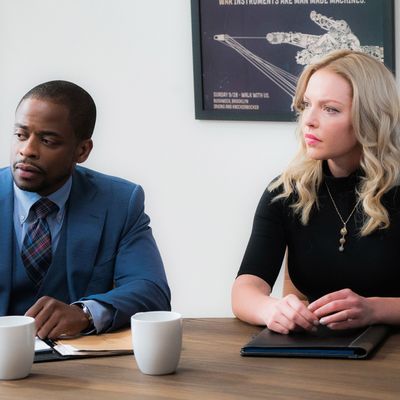
I had my doubts about Doubt, the new CBS legal drama co-created by Grey’s Anatomy veterans Tony Phelan and Joan Rater and starring another Grey’s alum, Katherine Heigl. At first glance, it seems like just another glossy, TV exploration of law and order, with Heigl in the role of fireball attorney crusading for justice while click-clacking through courtrooms in high heels.
In a lot of ways, that’s exactly what Doubt is. But it also happens to be a solid showcase for Heigl and her fellow actors, including Laverne Cox, who plays a trans lawyer on a prime-time CBS show in a role that acknowledges the character’s sexual identity but also emphasizes that, like any woman, Cox’s Cameron Wirth is a multidimensional human being who isn’t defined solely by her orientation or gender. Doubt may be a standard, mainstream network show set within the judicial system, but it also clearly has higher ambitions.
Admittedly, those broader ambitions can get crowded out by the more predictable plot turns in Doubt, including the ones that arise as Sadie Ellis (Heigl) and her frequent legal partner, Albert Cobb (Dulé Hill), attempt to defend a handsome, privileged pediatric surgeon (Steven Pasquale) freshly accused of murdering his girlfriend 25 years ago. That case winds its way through every episode, and also gives the show a romantic undercurrent, since of course — audible, exasperated sigh — Sadie and the surgeon, Billy, are hot for each other but trying to keep things professional. For Sadie and her colleagues at the Manhattan law firm overseen by legendary rabble-rouser Isaiah Roth (Elliott Gould), each episode also ushers in other new cases, some of which touch on hot-button issues, like mental health and rape culture.
Doubt falls prey to a lot of the pitfalls that afflict similar series, including leaps of legal logic — why look, here’s sudden evidence of a book deal that will prove a witness is not credible! — and aha moments that aren’t as mind-blowing as the writers want viewers to believe. In episode two, when Sadie defends a cantankerous former judge (Sam Anderson) accused of having nonconsensual sex with his Alzheimer’s-stricken wife, her assistant gives her the idea to call the wife’s nursing home aide to the stand. This is such an obvious move, it seems crazy that Sadie wasn’t planning to do it already, and even more bizarre that she deems the idea “genius.” Doubt never quite becomes The Grinder, the absurdly exaggerated legal procedural that Fox’s brilliant The Grinder was satirizing. But it does feel like Heigl could turn to camera at any moment and ask: “But what if it wasn’t?”
At the same time, there’s an acknowledgement of those genre tropes that makes it clear that Phelan, Rater, and their team are aware that they should tread lightly, even when they sometimes do the opposite. “This isn’t TV,” Albert says at one point while he and Sadie await lab work crucial to Billy’s case. “The DNA’s not coming back overnight.” It doesn’t come back overnight. Instead it waits … until the next episode.
Still, even the flimsier material on Doubt can be sold by these actors, including Heigl, who has been seeking a quality project to topline since she stopped playing Izzie Stevens on Grey’s Anatomy, and may finally have found one that sticks.
To a degree, Sadie is basically just Izzie in attorney’s clothing: She’s headstrong and passionate, but often plagued by insecurities about her professional and personal choices. The writers know exactly what sort of sheet music to hand to Heigl, and she plays the notes in a way that makes the character more relatable and watchable than she might have been in other hands.
Many of the supporting actors shine here, too. It’s especially great to see Cox, one of the breakout stars on Orange Is the New Black, playing a more dialed-down role here. (Lest any CBS viewers miss the point of how groundbreaking it is to see a trans character on a show like this, Cameron tells a client point-blank in the first episode: “I’m a woman, but I used to be a man.” In the second, she again refers to having transitioned. By the third, a male colleague flirts with her and the fact that she’s trans doesn’t even enter into it.) Then there’s the magnificent Judith Light, who has a small recurring part as a central figure in Sadie’s life, but infuses every moment with a palpable mix of regret and perseverance.
Is it pretty ridiculous that Sadie and Bill have to be romantically involved, and can’t merely exist as lawyer and client? Yes, but this is slightly less maddening when one realizes that balancing romance and legal responsibility has been a problem for other characters, and one that looms over Sadie’s life in larger, formative ways. That doesn’t make this narrative thread entirely unproblematic, but it does give it something of a purpose.
In the second of the three episodes made available to critics, after Sadie questions Anderson’s judge in court in a particularly inspired way, he whispers to her: “I see what you were doing there. Nice job.”
It’s an unnecessary moment that points to Doubt’s tendency to hammer things home too bluntly; the same sentiment could have been expressed just as easily with no dialogue at all, and just a shared, knowing glance between the two characters. But that comment also perfectly summarizes the experience of watching Doubt. In almost every episode, you can see exactly what it’s doing. Even so, you may feel compelled to say, “Nice job.”


